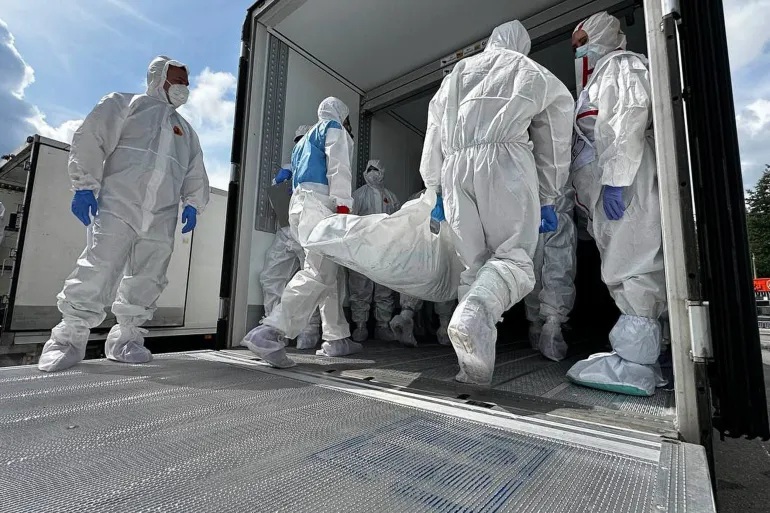Russia and Ukraine have resumed the deeply emotional exchange of war dead and captured soldiers, Moscow announced on Thursday, one of the few remnant outcomes from last month’s second round of peace talks in Turkey.
According to Kremlin adviser and Russia’s chief negotiator, Vladimir Medinsky, 1,000 bodies of Ukrainian soldiers were handed to Kyiv, while Russia received 19 of its own fallen servicemen
Photographs posted by Medinsky on Telegram depicted personnel in white medical gear transferring sealed body bags from refrigerated trucks, a solemn reminder of the human toll behind diplomatic efforts.
The Russian state news outlet RIA clarified that this was just the opening move in a broader plan to repatriate 3,000 Ukrainian bodies
These exchanges make up one of the few concrete successes from the Istanbul negotiations, which marked the first direct contact between Russia and Ukraine since early 2022.
Since restarting in May, both nations have carried out several such exchanges involving both captured soldiers and the remains of the dead
Back in early June, during their face-to-face talks in Istanbul, delegates from both sides committed to repatriating at least 6,000 bodies in total, 3,000 from each side.
This was alongside swapping at least 1,000 wounded or captured soldiers each, including all fighters under 25
That agreement laid the groundwork for today’s grim yet poignant developments.
Despite some optimism about a ceasefire, substantive progress towards a broader peace deal has stalled.
At that same Istanbul meeting, Russia made aggressive demands, demanding Ukraine cede territory and forego Western military aid.
These demands Kyiv publicly rejected as non-starters
Complicating matters further, outside groups have taken an active role in addressing the consequences of war.
In a separate but related development, Qatar’s embassy in Moscow facilitated the reunification of 11 Ukrainian children with their families, while three children were returned to homes in Russia.
According to Ukrainian officials, around 20,000 children were removed from contested regions during the conflict.
Also, Moscow has now received lists of hundreds of those children taken since 2022, actions that led to President Putin being indicted by the International Criminal Court for alleged war crimes involving child deportations.
The fragile atmosphere did not prevent ongoing violence.
Just hours before the latest exchange, Russian forces dropped a 500 kg bomb on a shopping centre and open-air market in Dobropillia, eastern Ukraine, killing at least two civilians and injuring 22 others.
Simultaneously, Ukraine’s air force reported intercepting hundreds of Russian drones, some decoys, and a ballistic missile during an overnight barrage that struck cities such as Kharkiv, Kryvyi Rih, Vinnytsia, and Odesa.
On the ground, Russia also claimed territorial gains.
Its defence ministry stated that Popiv Yar in Donetsk, Degtiarne in Kharkiv, and Kamianske in Zaporizhzhia had fallen under its control .
These military moves and stalled diplomacy underscore the conflict’s entrenched nature.
Humanitarian gestures like these exchanges reportedly offer momentary relief. On the other hand, they haven’t yet shifted the trajectory of the war toward peace.
The return of bodies, while emotionally wrenching, is critical for Ukrainian forensic teams.
Analysts like those at Business Insider describe how teams of investigators and mortuary workers in Kyiv work tirelessly to identify bodies.
Many of the bodies are reportedly in a decomposed state, sometimes even booby‑trapped—before delivering them to grieving families, a painstaking process requiring DNA verification and
Despite the emotional weight, these exchanges demonstrate that even in full‑scale war, humanitarian channels may remain open.
Yet, as violence and territorial battles persist, family reunifications alone cannot halt the war.
The Istanbul accords represent a rare flash of diplomacy, but one whose promises remain fragile.







